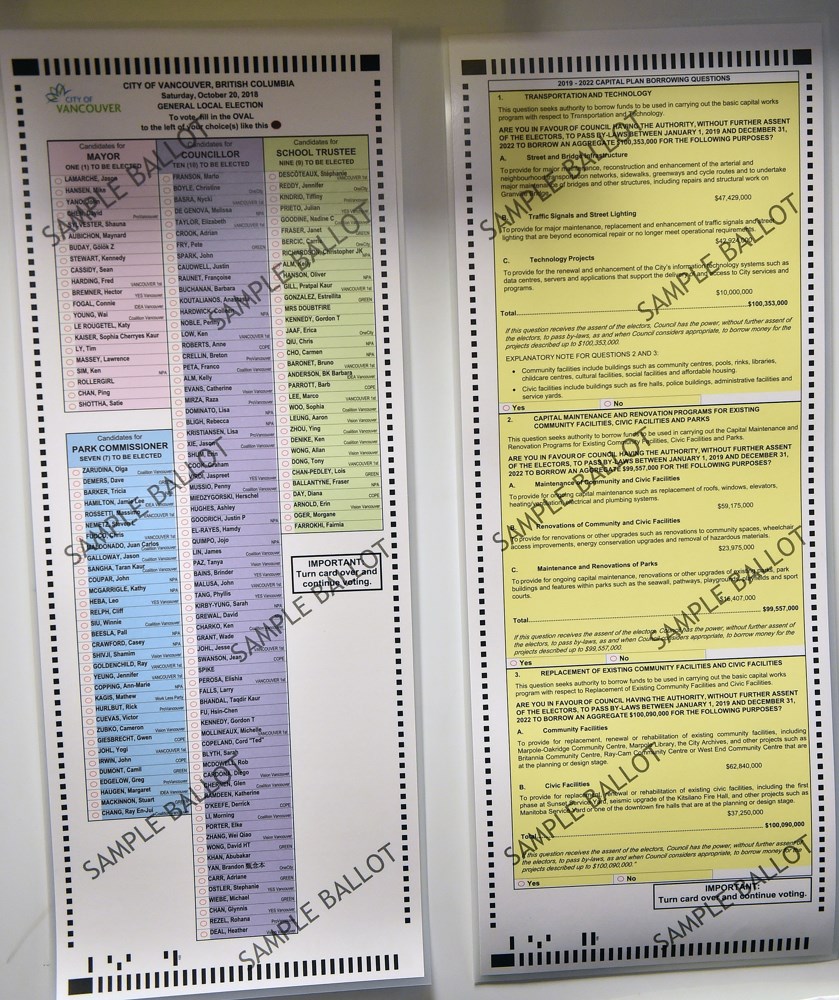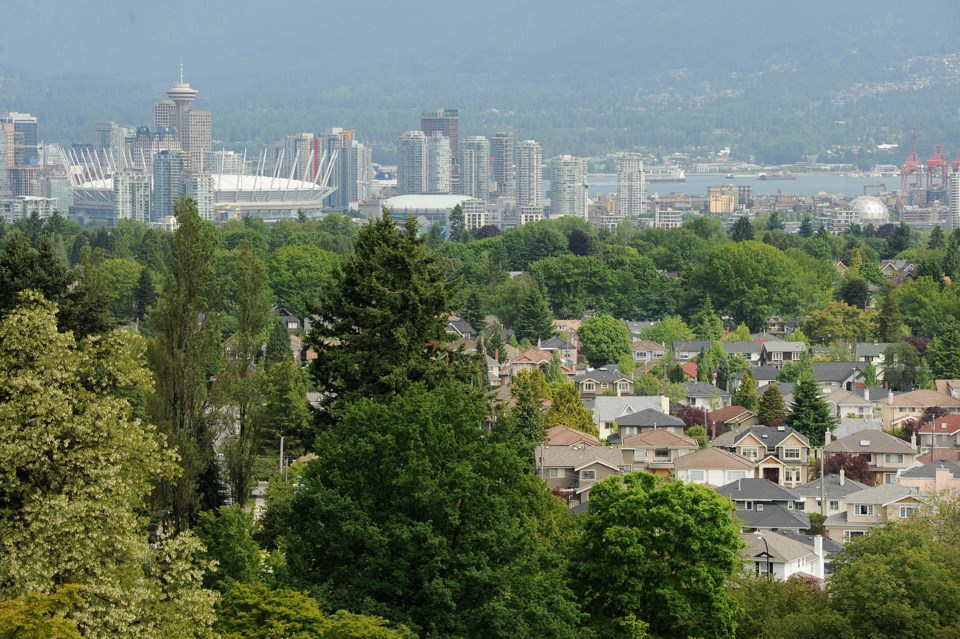Confused about which of the 21 mayoral candidates and 71 council candidates to vote for in the Oct. 20 civic election if tackling Vancouverâs affordable housing crisis is your top priority?
With candidates from nine political parties, numerous independents, and a non-alphabetical ballot, voters face a daunting task when it comes to familiarizing themselves with names, political parties and policy positions.
But UBC Sauder School of Business professor Tom Davidoff says, in terms of housing, itâs a matter of asking yourself a couple of key questions, among them:
- do you want to let people build more homes; and
- do you want to use taxes and regulations in a way that treats people better in the housing market who live and work in the city than those who buy second homes or Airbnb their empty homes.
âObviously, thatâs up to different people to decide, but both of those are important ways to get more affordable housing â you can have more housing and design policy so that the housing thatâs available is allocated first to people who live and work here, either through taxes or regulations,â he told the Courier.
Davidoff said voters can also narrow ballot options based on their thoughts about transportation.
âAnother thing [to consider], I think, is are you instinctively for transit, biking, walking, which generally is going to be associated with urbanism and more supply, or are you more for people ought to drive â letâs make it easy on drivers. That tends to be a more status quo position,â he said. âI jokingly said the theme song for this election should be âBike lane to the duplex zone,â but I really do think between those two positions â are you for making room [for more housing] and are you for bike lanes â that really says [if you are] for more affordable housing, allowing extra density, or [if you want to] preserve the status quo.â
Davidoff suspects it will be a âlow-information electionâ and doubts many voters will do a deep dive into candidate and party platforms, which is why he thinks itâs important to try and reduce the decision down to a few important issues.
HOUSING AT A GLANCE
NPA
Ken Sim, the NPAâs mayoral candidate, has promised a city-wide plan with consultation with residents. The NPA also promises to reduce permitting time, fast-track purpose-built rental housing and re-examine community amenity contributions. Sim has said the empty homes tax is not effective and he doesnât favour increasing it. The NPA says it would allow homeowners to have a second basement suite, which the party says has the potential to create 40,000 new units. ÌýThe partyâs current councillors â George Affleck, Elizabeth Ball and Melissa De Genova â voted against the cityâs first âquick startâ action in the Making Room housing program that will allow duplexes in most single-family neighbourhoods. They cited concerns including lack of consultation. Only De Genova is running for re-election.
Coalition Vancouver
The partyâs mayoral candidate, Wai Young, calls the cityâs Making Room program âa mistake,â that the party would repeal. Coalition Â鶹´«Ã½Ó³»argues that enough supply already exists in terms of unoccupied homes and units under construction, but what is missing is the ârightâ kind of housing, which the party says is purpose-built rental and co-op housing. Itâs promising a âneighbourhood-friendly City Plan,â and a freeze on the selling of city land. The party is running seven candidates for council.
OneCity
OneCityâs platform includes changing zoning laws to allow less-expensive forms of housing, such as apartments, in areas zoned for detached housing, instituting a land value capture tax, taxing residential properties over $4 million, building 12,000 affordable housing units on city-owned land, working to renew co-op leases, using rental-only zoning to protect existing rental supply, reserving a large portion of undeveloped land for new rental buildings, ensuring new developments designate a certain number of units to rental and implementing measures to protect renters. OneCity is running two candidates for council and has endorsed independent mayoral candidate Kennedy Stewart.
Vision Vancouver
Vision Â鶹´«Ã½Ó³»isnât running a mayoral candidate, but the party is fielding five council candidates, including incumbent Heather Deal. The party favours tripling the empty homes tax, creating more city-built affordable housing, including co-ops, expanding co-op housing, speeding up permitting for new housing and creating more housing options through the Making Room program. Mayor Gregor Robertson and all current Vision councillors voted in favour of allowing duplexes in most single-family zones.
Ìý

Ìý
Green Party
The Green Party isnât running a mayoral candidate, although it is running four council candidates, including incumbent Adriane Carr. The party promises to define affordability based on local salaries where people pay no more than 30 per cent of their incomes on housing, launch a city-funded, city-built housing program on city-owned land, change building code to allow more affordable housing, use conditional zoning in all new plans to supress land speculation and deliver public benefits, set a goal of 50 per cent below market rate housing overall for all new multi-residential development, and allow two or more secondary suites as incentives for retention and conversion of character homes. Carr voted against the proposal to allow duplexes in most single-family zones. She said she didn't see any evidence that the zoning change was important or needed. "The real point is that we need to build affordable homes through different kinds of housing types than the ones that are aimed [at] the upper end of the income scale," Carr said before voting against the plan.
Kennedy Stewart, independent mayoral candidate
Stewart promises to build 80,000 units of housing over the next 10 years with a focus on households earning less than $80,000 a year. He also wants to speed up the permitting process and work with the federal government on housing issues. He would improve the community amenity contribution process, he supports duplexes in single-family neighbourhoods and he would triple the empty homes tax. Stewart has promised to bring in a rentersâ advocate.
Shauna Sylvester, independent mayoral candidate
Sylvester aims to build affordable, purpose-built housing by leveraging city assets and cutting red tape. Her platform focuses on building co-op and co-housing complexes, encouraging purpose-built rentals, creating housing authorities to help house city workers, cutting red tape for affordable housing and completing community plans across Vancouver.
Yes Vancouver
Yes Vancouver, headed by mayoral candidate Hector Bremner, is running five candidates for council. Its housing plan involves legalizing and building more affordable housing, targeting speculators, not homeowners, and improving the development permit process. Bremner, who was elected as an NPA councillor in the byelection before starting Yes Vancouver, voted in favour of the plan to allow duplexes in most single-family neighbourhoods. He has also said itâs time to update the Bartholomew Plan from the late 1920s, which was the cityâs first comprehensive plan for the city and that his party would implement a three-year action plan to approve 50,000 to 70,000 more rental units for âthose that need it.â
COPE
COPE isnât running a mayoral candidate. Itâs running three council candidates. The party is promising to fight for a rent freeze, as well as a mansion tax on properties worth more than $5 million. It says it would ban renovictions, improve rental conditions, place a moratorium on the demolition of all rental buildings, regulate short-term rentals and end discrimination against pet-owners. The party also says it would build more than 2,000 modular housing units for the homeless and build more than 18,000 units of social and co-operative housing.
ProVancouver
The party is fielding David Chen as its mayoral candidate, as well as four candidates for council. Several of its candidates spoke against the Making Room program âquick-startâ action, which was approved, to allow duplexes in single-family neighbourhoods. They argued there wasnât sufficient consultation and âaffordability is a type of supply, not a result of it.â Chen has called for a full city plan. Among the partyâs other promises are: to create land-use-based zoning for transportation corridors, simplify the building code and requirements for purpose-built rentals, build more co-ops and social housing on city-owned land, prevent demovictions and renovictions, create a rental housing enforcement office and online rental registry, move towards 50/50 social housing versus market housing, build affordable housing on city-owned land at no more than 30 per cent of household average income for the district, and to stop land speculation.
Â鶹´«Ã½Ó³»1st
Fred Harding is Â鶹´«Ã½Ó³»1stâs mayoral candidate. The party is running six candidates for council. Harding has said his priorities include creating affordable housing, reducing taxes on homes and creating an official city plan. The party also plans to revoke the duplex rezoning, eliminate the empty homes tax, reduce and freeze property taxes for seniors and cut permit wait times for development.
ELECTION DAY APPROACHES
So how important is the outcome of the election with respect to housing?
Davidoff says: âI suspect we may be sliding into a housing dip â it looks that way â so whatever the government allows, builders may not be that excited about building. But that would be an opportunity for more social housing because the land costs would be lower and the government could get in."
He said while some steps have been taken on the demand side, including the empty homes tax and the provincial governmentâs so-called speculation tax, whether those types of measures continue to be supported could be quite consequential.
Meanwhile, Davidoff would like to see more candidates talking about the âincredibly important roleâ of community amenity contributions.
âAllowing developers to go beyond zoning and selling them the right to do that already is a third of the city budget and the process is not a great process today â it could be much improved,â he said.
âSo, you could not only build a lot more affordable units but you could make a huge amount of money to give cash benefits to working households. Iâve been disappointed not to hear more of that. A lot of the pro-housing stuff is letâs build â it can only be rental or it has to be social housing or it has to be not-for-profit, which is fine, but I donât think enough has been made of the fact that if you sell people the right to build condos, you can make an absolute fortune while adding a lot of supply, which helps affordability too.â
When it comes to election day, Davidoff expects many voters will rely on party brands despite the fact he thinks some âgreatâ independent candidates are running.
âItâs tough with 71 [council] candidates. My personal expectation is people are going to look for a party to hang their hat on when theyâre making the decision because reading 71 names â I think a lot of people are going to evaluate at the last minute,â he said.
CANDIDATES RUNNING IN THE 2018 CIVIC ELECTION
Profiles on mayoral candidates, including independents, can be found
Profiles on council candidates, including independents, can be found .
Profiles on school board candidates can be found .
Profiles on park board candidates can be found



